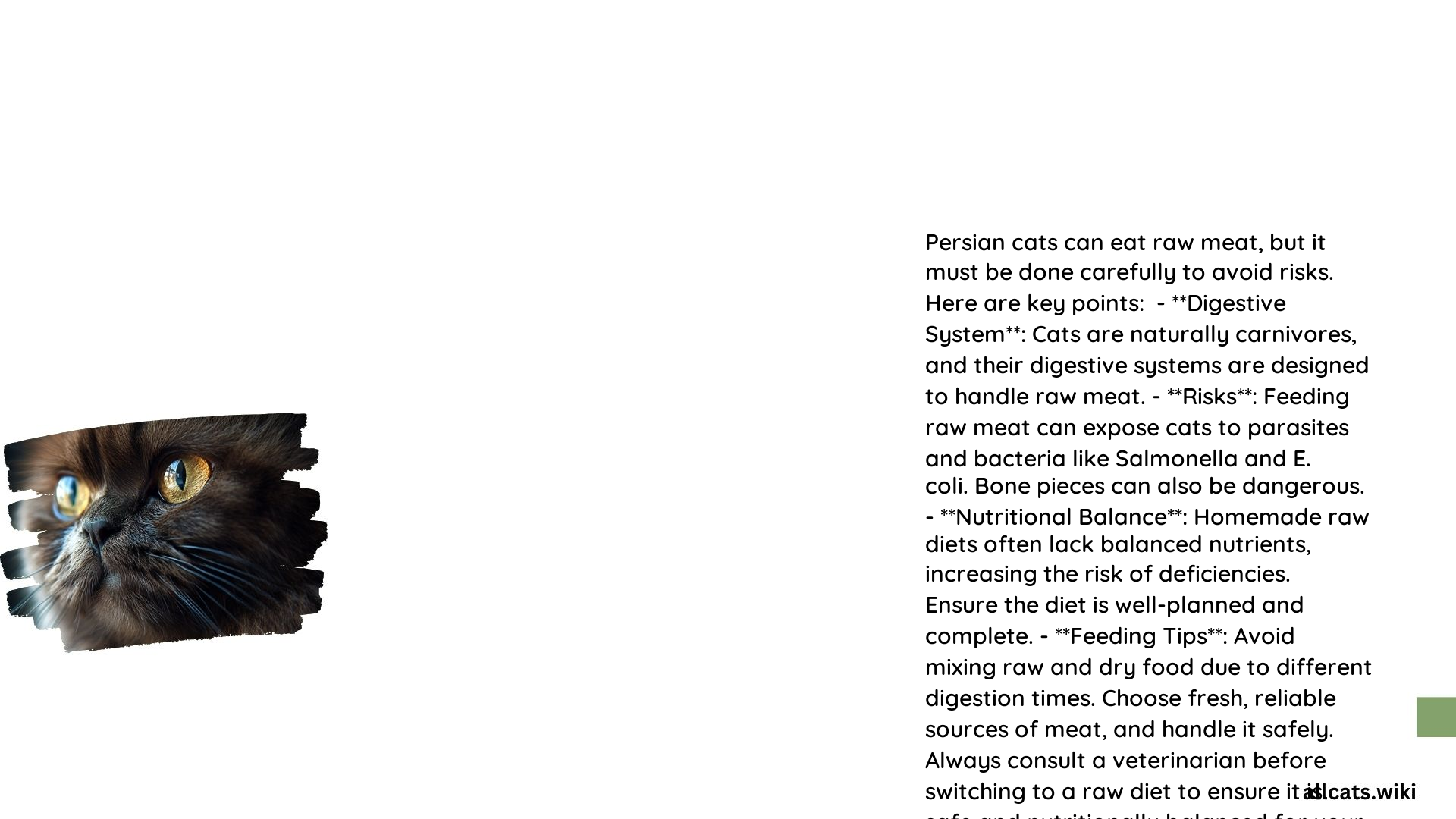Persian cats are a popular breed known for their luxurious coats and gentle personalities. When it comes to their dietary needs, many pet owners wonder if Persian cats can safely consume raw meat. This comprehensive analysis will explore the potential benefits, risks, and guidelines for feeding raw meat to Persian cats.
Can Persian Cats Eat Raw Meat?
What are the Potential Benefits of Feeding Raw Meat to Persian Cats?
- Improved Coat and Skin Health: The natural enzymes and nutrients present in raw meat may contribute to a shinier coat and reduced skin issues in Persian cats.
- Potential Allergen Avoidance: Feeding raw meat can help mitigate potential food allergies or sensitivities by avoiding certain processed ingredients commonly found in commercial cat food.
What are the Potential Risks of Feeding Raw Meat to Persian Cats?
- Bacterial Contamination: Raw meat can pose a risk of bacterial contamination, such as Salmonella or E. coli, which can be harmful to both cats and their human caregivers.
- Nutritional Imbalances: An all-meat diet without proper supplementation can lead to nutritional deficiencies, particularly a lack of calcium, which is crucial for bone health.
- Digestive Issues: Some Persian cats may experience digestive issues, such as vomiting or diarrhea, when transitioning to a raw meat diet.
What Guidelines and Recommendations Should Be Followed When Feeding Raw Meat to Persian Cats?
- Consult a Veterinarian: Before starting a raw meat diet, it is essential to consult with a veterinarian to ensure the diet is balanced and safe for your Persian cat.
- Trusted Suppliers: Use reputable suppliers or butchers who provide high-quality, human-grade raw meat. Ensure the meat is handled and stored properly to minimize the risk of bacterial contamination.
- Variety of Meats: Offer a variety of meats, such as chicken, turkey, beef, or lamb, to ensure a well-rounded diet. This helps prevent nutritional deficiencies.
- Calcium Sources: Include sources of calcium, such as raw meaty bones, ground bones, bone meal, or calcium supplements, to prevent nutritional imbalances.
- Proper Handling and Storage: Keep raw meat refrigerated or frozen to reduce the risk of bacterial growth. Proper freezing practices can help kill certain parasites.
What Specific Considerations Should Be Made When Feeding Raw Pork or Wild Boar Meat to Persian Cats?
- Risk of Trichinosis: Raw pork and wild boar meat can pose a risk of Trichinosis, a parasitic infection caused by Trichinella spiralis. It is crucial to freeze the meat at -20°C (-4°F) for at least 30 days to kill the parasites.
- Handling Precautions: Ensure that raw pork or wild boar meat is handled and stored separately from other meats to prevent cross-contamination.
- Health Implications: If not handled properly, feeding raw pork or wild boar meat can lead to serious health issues, including Trichinosis, which can be fatal if not treated promptly.
What Recommended Quantities and Precautions Should Be Taken When Feeding Raw Meat to Persian Cats?
- Balanced Diet: Ensure the raw meat diet is balanced and includes all necessary nutrients. A general guideline is to provide a mix of muscle meat, organs, and bones, but the exact proportions should be determined by a veterinarian.
- Gradual Transition: When transitioning a kitten to a raw meat diet, introduce the new food gradually to prevent digestive upset. Always include a source of calcium from the beginning.
- Avoid All-Meat Diets: Never feed an all-meat diet without proper supplementation, as this can lead to severe nutritional deficiencies.
In conclusion, feeding raw meat to Persian cats can be beneficial if done correctly, but it also comes with significant risks that need to be managed. It is crucial to consult with a veterinarian, ensure proper handling and storage of the meat, and include necessary sources of calcium to prevent nutritional imbalances.

